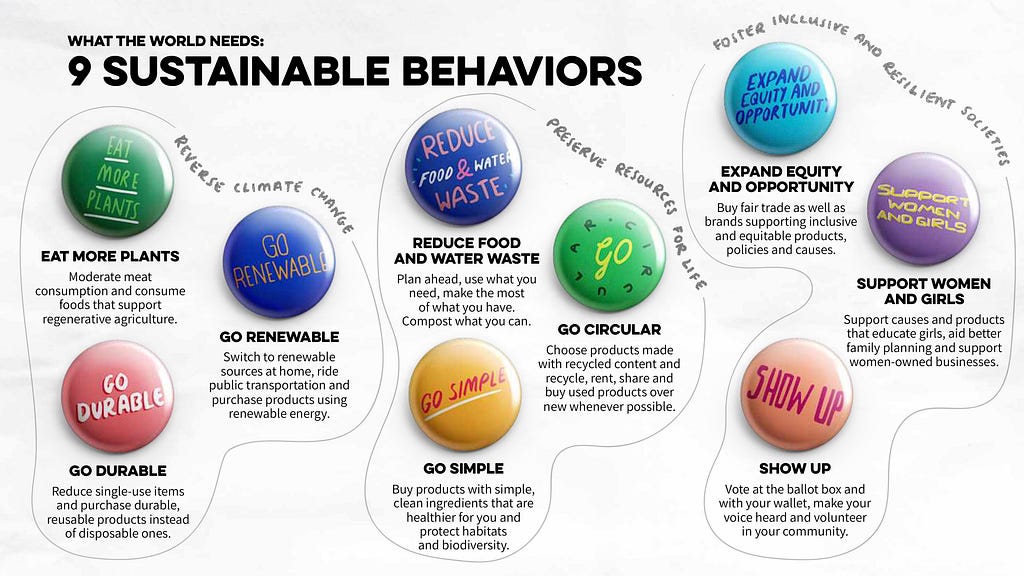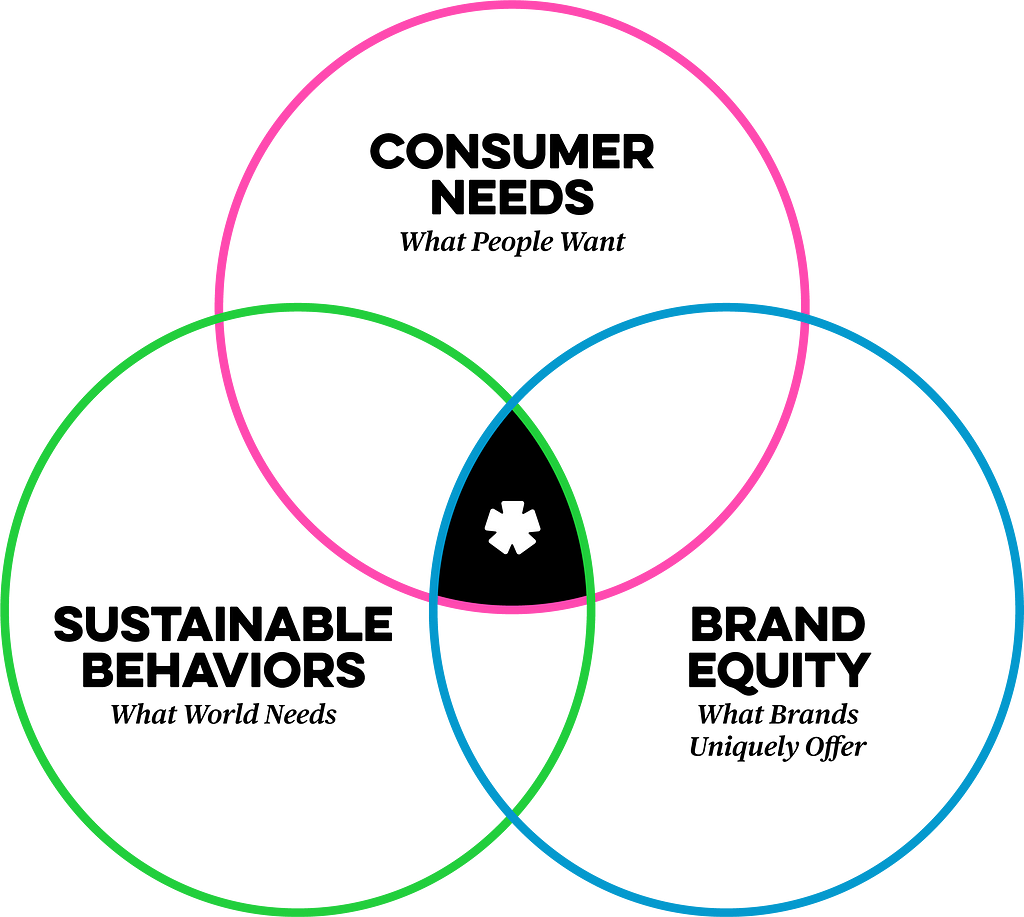And the New Pull Factor Report Provides a Framework to Unlock Brand Relevance

In the past few years, there has been an awakening that we all must get more conscious in our consumption habits. We’re realizing the ill effects our way of life is having on the planet we all share, and increasingly people are seeking sustainable alternatives and embracing brands that have a commitment to positive social impact. The growth of the Certified B Corporation movement has also shown that the idea of voting every day with your wallet is catching on.
With less than 10 years to create solutions for the irreversible impacts of climate change and systemic challenges of resource scarcity, inequality and injustice, businesses have a huge role to play in helping to solve the biggest challenges of our time while also meeting the immediate needs of consumers.
No pressure, right?
Meanwhile, for consumers who have the desire to live more sustainably, adopting sustainable behaviors is sometimes easier said than done. Our research found that 65% of consumers say they want to buy products that don’t harm others or the planet, but only 25% say they have actually rewarded companies with responsible practices.
Why the gap? Practical concerns get in the way. It’s too costly, or inconvenient, or makes people compromise on style or function. To achieve the “good life” they desire, consumers are asking brands to step up.
Meanwhile, brands are working hard to deliver on pledges and ambitions to create more sustainable systems, products and practices. Yet so much of that effort is going unseen because consumers aren’t always a part of the journey.
So with consumers and brands both struggling to do their part to get our planet back on track, how might we close the gap between intent and action while still serving everyone’s needs and desires?
Is your business looking for ideas on making a positive environmental impact? Check this free online report from B Lab that compiles articles and resources to help your business become a climate leader. Whether you work at a large company or an agency, get inspired to do more today.
Creating the Pull Factor Framework
To meet this moment, BBMG and Sustainable Brands joined with a group of global brand leaders including Procter & Gamble Company, Estée Lauder Companies, Happy Family Organics, Keurig Dr Pepper, Target, Johnson & Johnson Consumer Health, National Geographic, Heineken USA and Veocel. Our partners helped make possible U.S. consumer research that revealed common human need states — things like needing to feel recognized and valued, or wanting to feel connected to nature and traditions — and a list of nine sustainable behaviors that together brands and consumers can adopt to help make a sustainable, equitable future possible for everyone.

The Pull Factor Project is a new way to build brands that no longer pushes sustainability but taps into the dynamics of human desire to create a pull factor.

It triangulates three drivers that are transformational in delivering the good life. Magic happens at the alignment of what people want with what the world needs and what brands uniquely offer. And it’s unlocking exciting thinking for how to close the gaps between our good intentions and our day-to-day behavior.
Brands with Pull Factor
In doing this research and building the Pull Factor framework, we took inspiration from brands that already seem to have cracked the code on how to make sustainable and equitable living not just the right thing to do, but the cool thing to do.
Every day we see more brands that are successfully marrying beautiful, delicious, premium, high-value product attributes with environmental and socially conscious design of goods, services and actions so consumers can shop consciously without feeling like there’s a trade-off. This is particularly common among B Corps, where this kind of holistic thinking is second nature.
Go Durable with Preserve
One of the nine behaviors we identified that can mitigate the effects of climate change is going durable: reducing single-use items and purchasing durable, reusable products instead of disposable ones. Ending single-use plastic is core to the mission of Massachusetts-based B Corp Preserve, known for its reusable picnic ware and personal care products like shavers and toothbrushes made from recycled plastics.
Taking its mission a step further, this year Preserve launched a line of products made from recycled ocean plastic called POPi (Preserve Ocean Plastic Initiative). The POPi shavers and toothbrushes help remove plastic waste from shorelines and rivers to prevent it from entering the oceans and harming marine life, and is done in partnership with the 5 Gyres Institute and Renew Oceans. Because POPi products are just as stylish and effective as any other Preserve product, there’s no trade-off for consumers who want to support the cause.
What’s more, choosing recycled, durable products like those from Preserve helps feed our human desire to feel savvy. Most of us love the convenience of disposable plasticware and personal care items, but we feel haunted by the guilt of all the plastic that ends up going to waste. Knowing that Preserve helps us reduce waste and reuse materials helps us feel like we are making the most of what we have.
Expand Equity and Opportunity with Ben & Jerry’s
A powerhouse B Corp that has led with values of equality and environmental stewardship from day one, Ben & Jerry’s continues to raise the bar for how a brand can disrupt culture for the better. Many of its efforts have been focused on another of our nine sustainable behaviors that can foster inclusive and resilient societies: expanding equity and opportunity by buying from brands that support inclusive and equitable products, policies and causes.
The company’s latest social good campaign focuses on front-end criminal justice reform and the racial injustice therein. This may seem like a stretch for a Vermont-based ice cream company whose leadership, employees and majority customers are not people of color. In fact, this was part of the effort’s appeal. It was an opportunity to dive deeper into understanding the issues behind other causes Ben & Jerry’s has supported, including expanding voting rights and getting money out of politics.
Before attempting to design programs to affect this complex issue, Ben & Jerry’s spent considerable time immersing its team members — traveling to urban cities to meet with people doing the work on the ground and finding the right partners to ensure the brand would be able to affect meaningful change and not just pay lip service to the issue.
To bring the story of its work to the masses and invite public support, Ben & Jerry’s launched Justice ReMix’d, a limited-edition flavor loaded with swirls of fudge and cinnamon. A portion of the proceeds from sales of Justice ReMix’d go to the Advancement Project to support its work on prison reform, on ending the school-to-prison pipeline, and working with Black Lives Matter.
From a sustainability point of view, it’s all connected: prison reform, LGBTQ+ inclusivity, environmental justice, voting rights. All these causes help foster inclusive and resilient societies. From a consumer perspective, purchasing a delicious pint of ice cream to support a cause couldn’t be a more easy and enjoyable way to serve our own human need for a sense of purpose. We all want to live with meaning and make an impact in the world, and Ben & Jerry’s gives us an easy way to play a small part. Plus the company offers plenty of information and tools for people who want to get more actively involved.
Go Simple with Beautycounter
The cosmetics and skin-care company Beautycounter is built on the mission of providing safer products. For this B Corp, clean beauty is not a campaign or a side issue, it’s 100% at the core of its business. Beautycounter embodies one of our nine sustainable behaviors that can help preserve resources for life: go simple by using products with clean ingredients that are healthier for you and protect habitats and biodiversity.
This mission is best captured in Beautycounter’s “Never List,” a list of over 1,500 questionable ingredients that are not used in its formulas because they are known to cause potential harm to our bodies and our environment. They also provide consumers with tools to help Beautycounter advocate for reforms in the industry and in government regulations so that clean beauty can someday become the norm.
The idea of clean beauty extends to Beautycounter’s celebration of all the ways people can define beauty on their own terms, be comfortable with themselves and take charge of their own health, which taps into our human desire for worth — to feel recognized and valued for who we are.
Putting the Pull Factor Into Action
What ideas and impact could you imagine for your brand if you asked, what if …? That’s the invitation of the Pull Factor Project. Through this deceptively simple framework that unites our human desires and needs with what is most crucial for the future of our planet, we hope to see more companies behaving like B Corps — integrating sustainability and social impact into their brand purpose and into their approach to marketing and product innovation. The payoff will be a world where doing the right thing won’t constantly be at odds with the material things we need to live a fulfilling life.
This article was written by Liz Schroeter Courtney, Business Development Manager at BBMG.
B the Change gathers and shares the voices from within the movement of people using business as a force for good and the community of Certified B Corporations. The opinions expressed do not necessarily reflect those of the nonprofit B Lab.

B Corps Create a Culture of Sustainable Living was originally published in B the Change on Medium, where people are continuing the conversation by highlighting and responding to this story.
Source: B the Change
